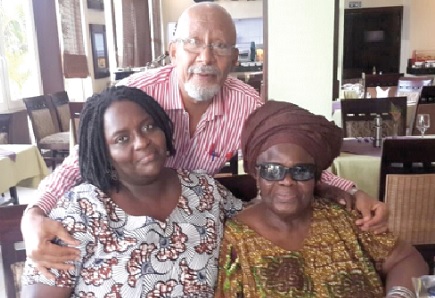
Ama Ata Aidoo (1942–2023) - In memory of an iconic writer, feminist, mentor
What do you do when you lose your staunch mentors, and you find it impossible to fill the void?
I met Mr K.B. Asante (1924 – 2018) through the Daily Graphic. His column, “Voice From Afar”, and mine, “Education Matters” both appeared on Mondays in the daily.
Whenever I needed stimulation to finish a column, he offered it by example. He wrote into his 90 years with clarity and commitment in sharing his rich experiences.
Prof. Kwabena Nketia (1921 – 2019) and I became friends when he came to Los Angeles to teach at the University of California (UCLA). He contributed to articles for a paper I published at the time.
With my wife and Mrs Lily Nketia, we became family and, finally, we all relocated to Ghana.
My former Mfantsipim headmaster, Francis L. Bartels (1913 – 2013) was to become my counsellor by default, and I’d defer to him often for advice.
We loved each other’s work! I remember him once telling me, “I will live to be over 100 years.”
And he did! He beat the 100-year mark by one week.
My sister from another mother, Ama Ata Aidoo, and I hooked up like twins the very first day we met in Accra.
She was well known to Prof. Nketia, whom I contacted when writing my first article about her work, “Ama Ata Aidoo Makes Ghana Proud” in 2011.
Literary genius
Prof. Nketia recalled Ms Aidoo’s first important play, The Dilemma of a Ghost, which premiered in 1964 at the University of Ghana when she was a student there.
Recalling that nostalgic event, Prof. Nketia said, “My own children performed in the play:
Akosua was eleven, and her brother, Kwabena, was about ten.”
The Dilemma of a Ghost, Ms Aidoo’s masterly play, portrayed the clash between traditional culture and Western values.
Using a narrative technique fusing both prose and poetry, she explored the conflicted environment of an African husband and his African-American wife.
Returning from Stanford University, California, to teach at the University of Cape Coast, Ms Aidoo released her other play, Anowa, in 1970.
The play was set in the late 19th century, and featured the beautiful strong-willed Anowa who refuted tradition, but soon got entangled in a childless marriage to a man “she chose” herself, a man who was alleged to “trade” his manhood for wealth and slaves on “the whole Guinea coast”.
The poetry in the drama was splendid, exemplified by this juicy inkling from an old man character erotically taunted by Anowa’s charm:
Beautiful as Korado Ahima, / Someone’s – Thin-Thread. / A dainty little pot / Well-baked, / And polished smooth / To set in a nobleman’s corner.
With Pan-African overtures, the plot reviews the theme of Africa’s own connivance in slavery, the “trade with the white men ... buying men and women.”
The play’s therapeutic import was captured in this commentary on YouTube:
“I appreciate her having the courage to really approach this topic.
Especially being a child of those taken into slavery.
I think the acknowledgement heals wounds and hopefully, people can work together to eradicate the slavery that still goes on today.”
Memories
Auntie Ama was a collector of choice experiences which she managed like precious objects.
She curated a rich store of anecdotes, figures of speech, selected reminiscences, and, above all, the nuggets of the local culture which truly defined her whole life.
Her impressions were implanted early from her youth while living with her father, whom she described variously as an “odikro” and a “proper chief”; and who was keen on having his precocious daughter go to school.
We spoke often on the phone, sometimes into the night, as she shared her well-honed beliefs which she laced with Fanti idioms for effect.
Where explanations were needed, she’d illustrate her ideas and why she thought the way she did.
She was a feminist, as she said, and hated the idea of girls and women not being taken seriously in a chauvinistic male-dominated world.
She was quick to quote J.E. Kwegyir Aggrey:
“If you educate a woman, you educate a nation.”
Additionally, she was concerned about the lack of proper infusion of local values in raising the Ghanaian youth to be confident in themselves and in each other.
Her sense of humour was charming, and it was quite difficult to end conversations with her.
I remember her once ending a call on the note:
“Me wura, koda. Adze asa.” [To wit: My dear, go to bed. It’s late.]
Quite recently, Apiorkor of Citi TV and I spoke at length about Auntie Ama’s works and discussed the possibility of visiting for an interview.
And to which she had agreed.
However, on calling her for a date, we found out she was not well.
She said hopefully when she recovered, we could meet.
That was our last conversation till her demise.
What a loss!
My other deep regret: she had invited me often to her house in Tema for lunch, with palm soup on the menu.
How I wish I had responded earlier, to be enamoured with that precious personality!
We tend to think our great mentors would live forever, and when they left, the voids were hard to fill.
I remember asking Kinna, the daughter, that with her mother, gone what was I to do without my mentor.
Her response was, “You’re on your own now!”
The writer is a trainer of teachers, leadership coach, motivational speaker and quality education advocate.
E-mail: anishaffar@gmail.com

